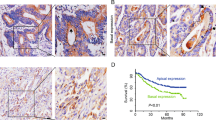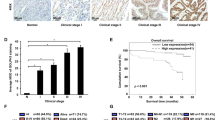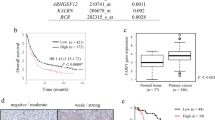Abstract
Fas signaling was reported to participate in cell apoptosis. However, this pathway has also been shown to promote tumor cell motility, leading to the hypothesis that Fas signaling may induce epithelial–mesenchymal transition (EMT) to promote metastasis. The effects of Fas-ligand (FasL) treatment and inhibition of Fas signaling on colorectal and gastric cancer cells were tested using motility assay, immunofluorescence, RT–PCR and immunoblot analyses. Fas signaling downregulated epithelial markers, upregulated mesenchymal markers and promoted motility in gastrointestinal (GI) cancer cells. FasL treatment also increased the expression of EMT transcriptional factors in the nucleus and induced a spindle shape cell morphology in these cells. Knockdown of Snail or Twist expression significantly decreased FasL-induced motility. The ERK1/2 pathway was activated by Fas signaling and is required for FasL-induced EMT and motility. Moreover, oxaliplatin, a chemotherapeutic agent, induced EMT partly through Fas signaling. Evaluation of human GI clinical specimens showed that FasL expression increased whereas E-cadherin expression decreased during GI cancer progression. Both markers were significantly inversely correlated. Tissue samples with a non-EMT phenotype were mainly distributed in patients with early cancer stages, whereas samples with an EMT phenotype were mostly distributed in patients with advanced cancer stages. A non-EMT phenotype significantly correlated with better prognosis. Altogether, these data indicate that Fas signaling may induce EMT to promote tumor motility and metastasis in GI cancer in vivo and in vitro.
This is a preview of subscription content, access via your institution
Access options
Subscribe to this journal
Receive 50 print issues and online access
$259.00 per year
only $5.18 per issue
Buy this article
- Purchase on Springer Link
- Instant access to full article PDF
Prices may be subject to local taxes which are calculated during checkout







Similar content being viewed by others
Abbreviations
- CRC:
-
colorectal cancer
- EMT:
-
epithelial–mesenchymal transition
- GC:
-
gastric cancer
- GI:
-
gastrointestinal
- IHC:
-
immunohistochemistry
References
Curtin JF, Cotter TG . Live and let die: regulatory mechanisms in Fas-mediated apoptosis. Cell Signal, 2003; 15: 983–992.
Shinohara H, Yagita H, Ikawa Y, Oyaizu N . Fas drives cell cycle progression in glioma cells via extracellular signalregulated kinase activation. Cancer Res, 2000; 60: 1766–1772.
Park DR, Thomsen AR, Frevert CW, Pham U, Skerrett SJ, Kiener PA et al. Fas (CD95) induces proinflammatory cytokine responses by human monocytes and monocyte-derived macrophagesJ Immunol, 2003; 170: 6209–6216.
Choi C, Xu X, Oh JW, Lee SJ, Gillespie GY, Park H et al. Fas-induced expression of chemokines in human glioma cells: involvement of extracellular signal-regulated Kinase1/2 and p38 mitogen-activated protein kinase. Cancer Res, 2001; 61: 3084–3091.
Chen L, Park SM, Tumanov AV, Hau A, Sawada K, Feig C et al. CD95 promotes tumor growth. Nature, 2010; 465: 492–496.
Barnhart BC, Legembre P, Pietras E, Bubici C, Franzoso G, Peter ME . CD95 ligand induces motility and invasiveness of apoptosis-resistant tumor cells. EMBO J, 2004; 23: 3175–3185.
Desbarats J, Newell MK . Fas engagement accelerates liver regeneration after partial hepatectomy. Nat Med, 2000; 6: 920–923.
Lavrik IN, Golks A, Riess D, Bentele M, Eils R, Krammer PH . Analysis of CD95 threshold signaling. J Biol Chem, 2007; 282: 13664–13671.
Kleber S, Sancho-Martinez I, Wiestler B, Beisel A, Gieffers C, Hill O et al. Yes and PI3K bind CD95 to signal invasion of glioblastoma. Cancer Cell, 2008; 13: 235–248.
Jemal A, Bray F, Center MM, Ferlay J, Ward E, Forman D et al. Global cancer statistics. CA: Cancer J Clin, 2011; 61: 69–90.
Griffin MR, Bergstralh EJ, Coffey RJ, Beart RW, Melton LJ . Predictors of survival after curative resection of carcinoma of the colon and rectum. Cancer, 1987; 60: 2318–2324.
O'Brien DI, Nally K, Kelly RG, O’Connor TM, Shanahan F, O’Connell J . Targeting the Fas/Fas ligand pathway in cancer. Expert Opin Ther Targets, 2005; 9: 1031–1044.
Adam R, Pascal G, Castaing D, Azoulay D, Delvart V, Paule B et al. Tumor progression while on chemotherapy. Ann Surg, 2004; 240: 1052–1064.
Kalluri R . EMT: when epithelial cells decide to become mesenchymal-like cells. J Clin Invest, 2009; 119: 1417–1419.
Przybylo JA, Radisky DC . Matrix metalloproteinase-induced epithelial mesenchymal transition: tumor progression at Snail’s pace. Int J Biochem Cell Biol, 2007; 39: 1082–1088.
Turley EA, Veiseh M, Radisky DC, Bissell MJ . Mechanisms of disease: epithelial-mesenchymal transition—does cellular plasticity fuel neoplastic progression? Nat Clin Pract Oncol, 2008; 5: 280–290.
Huber MA, Kraut N, Beug H . Molecular requirements for epithelial-mesenchymal transition during tumor progression. Curr Opin Cell Biol, 2005; 17: 548–558.
Li H, Zheng H, Liu J, Houghton J . CD95 signaling induces EMT in colon cancer cells. Gastroenterology, 2011; 140: S–162.
Li H, Cai X, Fan X, Moquin B, Stoicov C, Houghton J . Fas Ag-FasL coupling leads to ERK1/2-mediated proliferation of gastric mucosal cells. Am J Physiol Gastrointest Liver Physiol, 2008; 294: G263–G275.
Mitsiades N, Yu WH, Poulaki V, Tsokos M, Stamenkovic I . Matrix metalloproteinase-7-mediated cleavage of Fas ligand protects tumor cells from chemotherapeutic drug cytotoxicity. Cancer Res, 2001; 61: 577–581.
Ametller E, Garcia-Recio S, Costamagna D, Mayordomo C, Fernández-Nogueira P, Carbó N et al. Tumor promoting effects of CD95 signaling inchemoresistant cells. Mol Cancer, 2010; 9: 161.
Medici D, Hay ED, Goodenough DA . Cooperation between Snail and LEF-1 transcription factors is essential for TGF-1-induced epithelial-mesenchymal transition. Mol biol cell, 2006; 17: 1871–1879.
Higgs HN, Peterson KJ . Phylogenetic analysis of the formin homology 2 domain. Mol Biol Cell, 2005; 16: 1–13.
Kalluri R, Neilson EG . Epithelial-mesenchymal transition and its implications for fibrosis. J Clin Invest, 2003; 112: 1776–1784.
Yan W, Fu Y, Tian D, Liao J, Liu M, Wang B et al. PI3 kinase/Akt signaling mediates epithelial-mesenchymal transition in hypoxic hepatocellular carcinoma cells. Biochem Biophys Res Commun, 2009; 382: 631–636.
Desbarats J, Birge RB, Mimouni-Rongy M, Weinstein DE, Palerme JS, Newell MK . Fas engagement induces neurite growth through ERK activation and p35 upregulation. Nat Cell Biol, 2003; 5: 118–125.
Zhu Q, Liu JY, Yang CM, Xu HW, Zhang AZ, Cui Y et al. Influence of antitumor drugs on the expression of Fas system in SW480 colon cancer cells. Eur J Gastroen Hepat, 2006; 18: 1071–1077.
Yang AD, Fan F, Camp ER, van Buren G, Liu W, Somcio R et al. Chronic oxaliplatin resistance induces epithelial-to -mesenchymal transition in colorectal cancer cell lines. Clin Cancer Res, 2006; 12: 4147–4153.
Pryczynicz A, Guziñska-Ustymowicz K, Kemona A . Fas/FasL expression in colorectal cancer. An immunohistochemical study. Folia Histochem Cytobiol, 2010; 48: 425–429.
Tsanou E, Peschos D, Batistatou A, Charalabopoulos A, Charalabopoulos K . The E-cadherin adhesion molecule and colorectal cancer. Anticancer Res, 2008; 28: 3815–3826.
Li H, Fan X, Stoicov C, Liu JH, Zubair S, Tsai E et al. Human and mouse colon cancer utilizes CD95 signaling for localgrowth and metastatic spread to liver. Gastroenterology, 2009; 137: 934–944.
Wang J, Wang XY, Gong W, Mi B, Liu S, Jiang B . Increased expression of b-Catenin, phosphorylated glycogen synthase kinase 3b, cyclin D1, and c-myc in laterally spreading colorectal tumors. J Histochem Cytochem, 2009; 57: 363–371.
Soumaoro LT, Uetake H, Higuchi T, Takagi Y, Enomoto M, Sugihara K . Cyclooxygenase-2 expression: a significant prognostic indicator for patients with colorectal cancer. Clin Cancer Res, 2004; 10: 8465–8471.
Acknowledgements
This study was supported by Science and Technology Project of Guangzhou (2009Z1-E051) and Nanfang Hospital President Foundation(2011C015).
Author information
Authors and Affiliations
Corresponding author
Ethics declarations
Competing interests
The authors declare no conflict of interest.
Additional information
Supplementary Information accompanies the paper on the Oncogene website
Supplementary information
Rights and permissions
About this article
Cite this article
Zheng, H., Cai, Y., Wang, Y. et al. Fas signaling promotes motility and metastasis through epithelial–mesenchymal transition in gastrointestinal cancer. Oncogene 32, 1183–1192 (2013). https://doi.org/10.1038/onc.2012.126
Received:
Revised:
Accepted:
Published:
Issue Date:
DOI: https://doi.org/10.1038/onc.2012.126
Keywords
This article is cited by
-
Evaluation of ITGB1 expression as a predictor of the therapeutic effects of immune checkpoint inhibitors in gastric cancer
BMC Gastroenterology (2023)
-
Regulation of cancer stem cell properties, angiogenesis, and vasculogenic mimicry by miR-450a-5p/SOX2 axis in colorectal cancer
Cell Death & Disease (2020)
-
Transcriptional analysis of cleft palate in TGFβ3 mutant mice
Scientific Reports (2020)
-
ATXN2L upregulated by epidermal growth factor promotes gastric cancer cell invasiveness and oxaliplatin resistance
Cell Death & Disease (2019)
-
Caspase-independent cell death does not elicit a proliferative response in melanoma cancer cells
BMC Cell Biology (2018)



